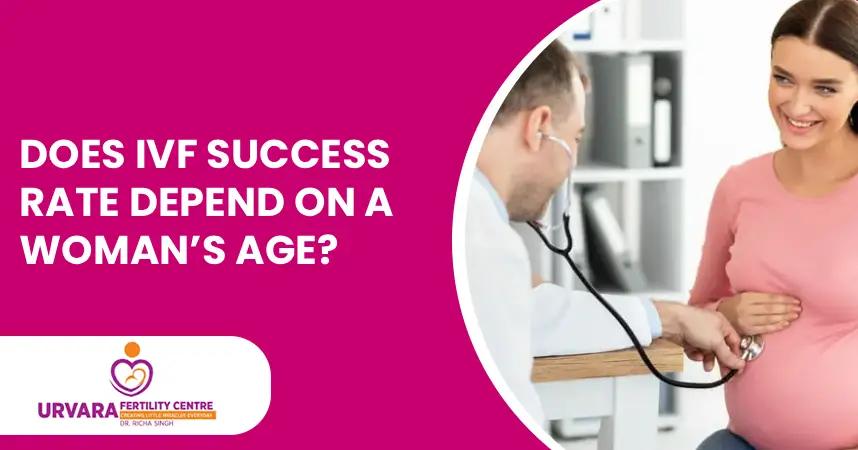
Does IVF Success Rate Depend on a Woman’s Age?
The success of IVF (In Vitro Fertilization) mostly depends on a woman’s age. Understanding this link is crucial for anyone considering IVF treatment. This guide will explain in simple terms why age affects IVF results, what the success rates are at different ages, and other important factors to consider before starting the process.
What is IVF and Why is It Needed?
IVF is a medical process to help people who have trouble getting pregnant. In IVF, eggs are taken from a woman’s ovaries and fertilized by sperm in a laboratory. After the eggs develop into embryos (tiny early-stage babies), doctors transfer one or more embryos into the uterus, hoping for a pregnancy.
Doctors often suggest IVF when:
-
A woman’s fallopian tubes are blocked or damaged
-
There is male factor infertility (low sperm count or movement)
-
The couple has unexplained infertility
-
Other fertility treatments have not worked
The Role of Age in IVF Success-:
How Does Age Affect Fertility?
Every woman is born with all the eggs she will ever have. As women get older, especially after 30, both the total number of eggs (egg reserve) and their quality go down. After 35, these changes speed up. By the time a woman turns 40, her egg reserve and quality have dropped significantly.
In IVF, the eggs used for fertilization come from the woman’s ovaries. If these eggs are fewer in number, or less healthy, IVF becomes less likely to result in pregnancy or a healthy live birth.
Why Does Egg Quality Matter?
Egg quality decides if an egg can be fertilized and grow into a healthy embryo. As women age, their eggs are more likely to have genetic problems that can:
-
Make it harder for the embryo to grow and implant in the uterus
-
Increase the chances of miscarriage or Down syndrome
For example, the risk of miscarriage increases with age: it’s about 16% at age 30 and rises to 27% at age 40.
IVF Success Rates by Age Group
Let’s look at real success rates so it’s easy to see the effect of age:
|
Age Group |
IVF Success Rate (Live Birth per Cycle) |
|
Under 35 |
Over 40%–50% |
|
35–37 |
Around 30%–40% |
|
38–40 |
20%–27% |
|
41–42 |
About 10%–20% |
|
43 and older |
Less than 10%; often as low as 5% or below |
Success rates may be even higher at some clinics. For example, some claim up to 85% in women under 30. But national averages, as shared by health authorities, show a clear trend: the younger the woman, the higher the chance that IVF will lead to a baby.
How Age Changes the IVF Process and Choices
More Embryos, More Attempts
Younger women usually have more eggs, so doctors can try to fertilize and implant more embryos. This increases the likelihood of success for each IVF cycle. For older women, fewer eggs are collected, and often only a few are healthy enough to use.
The Possibility of Donor Eggs
For women over 40 (or sometimes even earlier if their own eggs are of poor quality), many doctors recommend using donated eggs from a young woman. IVF with donor eggs can offer much higher success rates, sometimes 70% or 80% per cycle, because the egg quality is more closely linked to donor age than the recipient’s age.
Hormonal Changes
As women age, hormone patterns also become less regular. This can cause ovulation problems (making eggs less available for IVF) and can make it harder for the uterus to receive and grow a healthy embryo.
Why IVF Success Drops with Age
Here are the main reasons:
-
Egg Quantity Drops: Women lose eggs every month. The loss becomes steep after 35.
-
Egg Quality Drops: Higher risk of genetic problems means more failed fertilizations or early miscarriages.
-
More Health Problems: Older women are more likely to have issues like fibroids, diabetes, or high blood pressure, making pregnancy riskier.
-
Changes in Uterus and Hormones: The uterus and hormone cycles can become less supportive of pregnancy.
Other Factors Affecting IVF Success
While age is the strongest factor, these also matter:
-
Male partner’s age and sperm quality
-
General health: Smoking, drinking, excess weight, or very low weight reduce chances
-
Type of infertility (blocked tubes, low sperm, unexplained reasons)
-
IVF clinic’s skill and technology
When to Start, and What to Expect
Doctors recommend that anyone who’s having trouble conceiving should seek a fertility check earlier rather than later. If a woman is under 35 and hasn’t conceived after 1 year of trying, see a doctor. For women over 35, wait only 6 months before getting help.
Women should discuss all options, including possible use of donor eggs, with their fertility specialist. Fertility testing (like checking the ovarian reserve with blood tests and scans) helps estimate success chances before starting IVF, saving time, money, and emotional energy.
Read More: Can You Have a Normal Delivery After IVF?
Tips to Improve IVF Success
-
Act Early: Starting IVF at a younger age improves the chances.
-
Stay Healthy: Eat well, exercise, manage stress, and avoid smoking or heavy drinking.
-
Get Good Fertility Advice: Not all clinics offer the same technology or support—find a reputable IVF clinic.
-
Consider All Options: Be open to suggestions like egg or embryo freezing (if starting a family later), donor eggs, or pre-implantation genetic testing.
Final Thoughts
IVF has allowed millions to become parents, but age remains the single biggest predictor of success. Knowing the facts helps couples set realistic goals, make better decisions, and keep hope alive on their fertility journey. Choosing to act sooner and seeking the right support can make all the difference.
Content Created By:

Cyberbizz Technologies
Team - Content Curator

